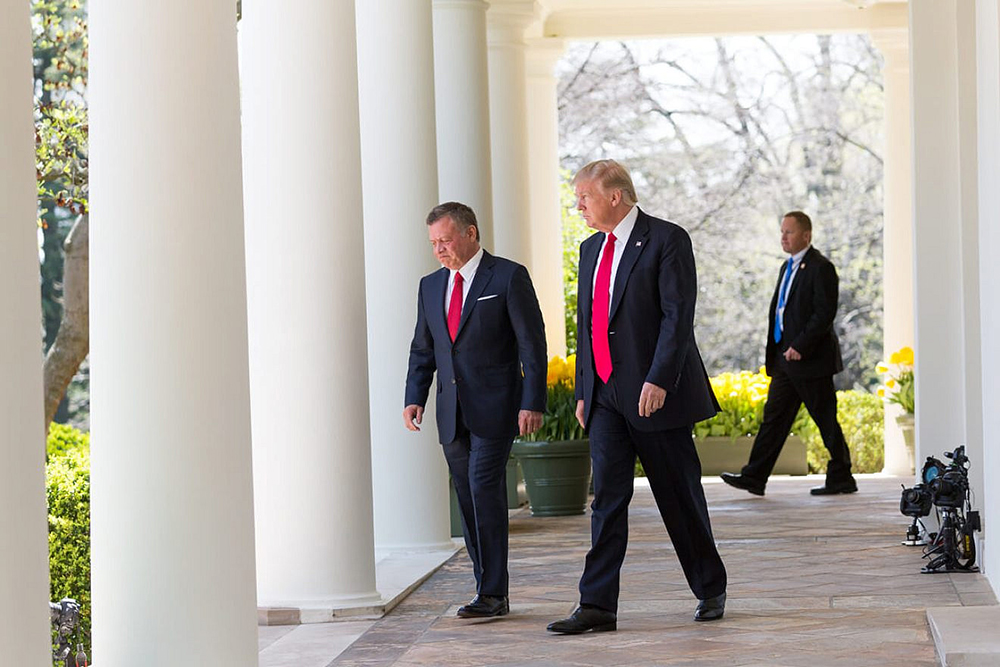|
Getting your Trinity Audio player ready...
|
The Hashemite leader agreed to accept 2,000 severely ill children into his country, but stated that Arab leaders would present a counter proposal to the president’s idea to “own” Gaza.
By: Andrew Bernard
President Donald Trump hosted Jordanian King Abdullah II at the White House on Tuesday in an attempt to persuade regional leaders to accept his plan to relocate Palestinians out of the Gaza Strip.
Abdullah announced a proposal for Jordan to accept 2,000 children in Gaza grappling with cancer and other severe illnesses for treatment in the kingdom but did not express agreement with Trump’s plan for the United States to “own” the enclave and relocate its population to other countries.
Jordan and the United Arab Emirates are among the Arab countries that have previously accepted medical evacuees from Gaza for treatment.
The king said he and other Arab leaders would meet in Saudi Arabia soon to discuss an Egyptian counter-proposal to the Trump resettlement and redevelopment idea.
“We will be in Saudi Arabia to discuss how we can work with the president and with the United States,” Abdullah said. “Let’s wait until the Egyptians can come and present it to the president and not get ahead of ourselves.”
The meeting is Trump’s first with an Arab leader since he resumed office for a second term.
“He’s a great man,” Trump said of Abdullah, who was accompanied by his adult son, Crown Prince Hussein, when the two entered the White House complex earlier on Tuesday.
Trump said he and Abdullah would have a longer, private discussion about the plan to “own” and rebuild Gaza, which according to the U.S. president would include the resettlement of some 2 million Palestinians living in the coastal enclave to Egypt, Jordan or other regional countries.
“I believe we’ll have a parcel of land in Jordan,” Trump said. “I believe we’ll have a parcel of land in Egypt. We may have someplace else, but I think when we finish our talks, we’ll have a place where they’re going to live very happily and very safely.”
‘I think we’re above that’
Hosting large numbers of Palestinian refugees would not be unprecedented for Jordan though is potentially explosive politically.
Jordanians of Palestinian descent are thought to make up more than half of the population of Jordan, and the country hosts 2.4 million people registered as refugees with the U.N. Relief and Works Agency for Palestine Refugees, or UNRWA. Most, but not all, of those registered refugees have Jordanian citizenship. Jordan does not officially track Palestinian origin in its census data. The country also hosts hundreds of thousands of Syrian refugees.
Jordan, Egypt, Saudi Arabia, the United Arab Emirates and Qatar have previously written to U.S. Secretary of State Marco Rubio that they reject any plan to deport Palestinians from Gaza.
Trump said on Monday that he might be willing to withhold U.S. foreign aid from countries if they don’t agree to his plan, though ruled that option out on Tuesday in Jordan’s case.
“I don’t have to threaten that,” Trump said. “I think we’re above that.”
Details of Trump’s relocation and redevelopment plan remain sketchy, and Trump administration officials have given contradictory answers about whether the displacement would be temporary or permanent.
In an interview with Fox News released on Monday, Trump said displacement would be “permanent” because the reconstruction of Gaza would take “years.”
“I’m talking about building a permanent place for them because if they have to return now, it will be years before you could ever—it’s not habitable,” Trump said. “It will be years before it could happen.”
On Tuesday, however, the president seemed to suggest that Palestinians could eventually return to a rebuilt Gaza.
“A lot of those people that you’re talking about are going to end up maybe living there and maybe working there, but it’ll be in a different form,” he said.
Trump administration officials have also been vague about what would happen to Palestinians who refuse to leave Gaza.
‘I think it’s going to be great’
One reporter asked the president if what he was describing was “ethnic cleansing.”
“We’re moving them to a beautiful location where they have new homes, where they can live safely, where they have doctors and medical and all of those things,” Trump said. “I think it’s going to be great.”
Trump took shouted questions from reporters as Abdullah arrived at the White House complex, but answered only one about whether he intended to stick to a deadline he announced on Monday that Hamas had until noon on Saturday to release all its remaining hostages or he would “let hell break out.”
“Yes,” Trump said. He also appeared to answer a question about whether Hamas would listen to the deadline, but his response was inaudible.
In the Oval Office, Trump said he didn’t expect Hamas to be able to meet the Saturday deadline.
“I think they want to play tough guy, but we’ll see how tough they are,” he said.
Other topics of concern Trump and Abdullah might discuss include the potential extradition or expulsion of the convicted terrorist Ahlam Tamimi.
Tamimi is under criminal indictment in the United States for her role in orchestrating the Sbarro Pizza bombing in Jerusalem in August 2001 that killed 16 people, including U.S. citizens. Tamimi was convicted in Israeli courts but released to Jordan in the 2011 prisoner exchange with Hamas that freed Israel Defense Forces soldier Gilad Shalit. Jordan has refused to extradite her, despite a U.S.-Jordanian extradition treaty signed in 1995.
The speaker of Jordan’s parliament denied Israeli reports this month that Jordan was considering expelling or extraditing Tamimi.
(JNS.org)





